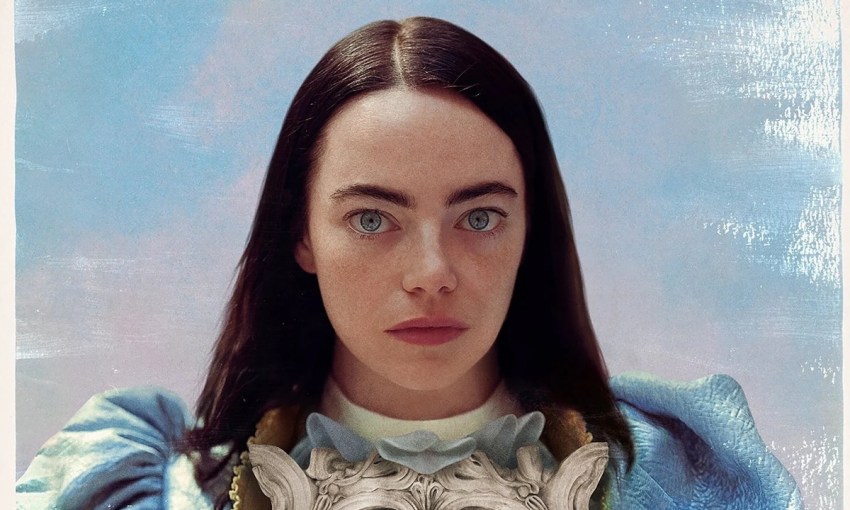Yorgos Lanthimos’s hilarious Poor Things combines the whimsy of a children’s storybook with explicitly adult satire, forming an absurd feminist fairy tale as sharp as it is entertaining.
AFF review: Poor Things
In a heightened early 20th century London, Bella Baxter (a marvellous Emma Stone) is brought back from the dead. Her world during the first act is shown to us in greyscale, conveying her growing boredom and desire for experience. Fisheye lenses are frequently employed, warping our view of Bella’s life to demonstrate the childlike discomfort and curiosity she seeks to satisfy. But her carer, Godwin Baxter, refuses to relax her confinement, afraid of what the world will do to her.
Godwin (Willem Dafoe) is a combination of Frankenstein and his monster, a hideously scarred and disfigured mad doctor/scientist. Dafoe elegantly conveys the haunted character’s horrific, ridiculous childhood with welcome humour, providing a performance at least on par with his endlessly watchable turn as the monologue-prone keeper in The Lighthouse.
Poor Things screens again for the Adelaide Film Festival on Friday, October 27th at 8:30pm at Goodwood’s Capris Theatre.
See the full program here.
The film emerges into vibrant colour as Bella’s worldly odyssey begins with her new companion, Duncan Wedderburn (Mark Ruffalo).
In a film filled with hilarious performances, Ruffalo shines as the self-aggrandising, suave womaniser barely hiding his pathetic insecurities. His exaggerated and frustrated flourishes increase as Bella’s growing desire for independence tests his fragile manhood (and cues a ridiculous dance sequence perhaps topping Stone’s effort in La-La Land).
Consistently rapid editing charts Bella’s precocious development, the feverish pacing only slowing down to bask in particularly important moments—an especially sweet romantic encounter, or confusion and realisation of Duncan’s emotional weakness.
This review was provided by the “2023 Emerging Screen Critics Program” – a Screen Studies collaboration between the Adelaide Film Festival and UniSA Creative, with the participation of students and mentors from the University of South Australia, the University of Adelaide and Flinders University. Supported by CityMag.
The cartoonishly dreamlike sets, both vast and wondrous yet surrealistically confined—as if part of a child’s playset—complement the blunt dialogue and, especially in Bella’s case, matter-of-fact delivery fans of Lanthimos’s previous The Lobster and The Favourite will recognise.
The humour in Poor Things, however, plays in contrast to these prior films; where they foreground dark, dry wittiness, here direct punchlines and hilariously immersion-breaking expletives are abundant. Poor Things may be Lanthimos’ most straight comedic work, it is no less intelligent as a piece of satire.
Throughout her adventures, Bella grapples with a woman’s place in her world: they are the playthings of men, without agency, unable to behave beyond society’s expectations. But, as Stone’s often hilarious childlike directness tells us, that’s not good enough for her.
Bella’s sexual awakening and exploration, in particular, play a strong role in both the film’s plot and larger commentary.
Where weaker scripts may rely on the trope of a woman who enjoys sex eventually being punished for such behaviour, Bella refuses this stereotype, offering instead a consistently sex-positive mindset as a key part of her journey into womanhood. And what a journey it is: Stone’s performance is remarkable, traversing curious infancy to world-weary womanhood with mesmerising physical and verbal commitment, as funny as it is enthralling.
Womanhood is front and centre: the “poor things” here are the men tormenting themselves, unable to process Bella’s unflinching independence. She is initially unable to understand feminine subservience and eventually refuses it altogether, the very thought nonsensical—leaving audiences to think the same thing.
Like any good fairy tale, Poor Things combines a delightfully whimsical tone with moral lessons. When paired with the explicit and adult themes of gender, sex, parenthood and love, Lanthimos’ wonderfully bizarre approach highlights the ridiculousness of our own society.
Featuring career-best performances from Stone, Ruffalo, and Dafoe, Poor Things is sure to be one of Adelaide Film Festival’s biggest hits.




